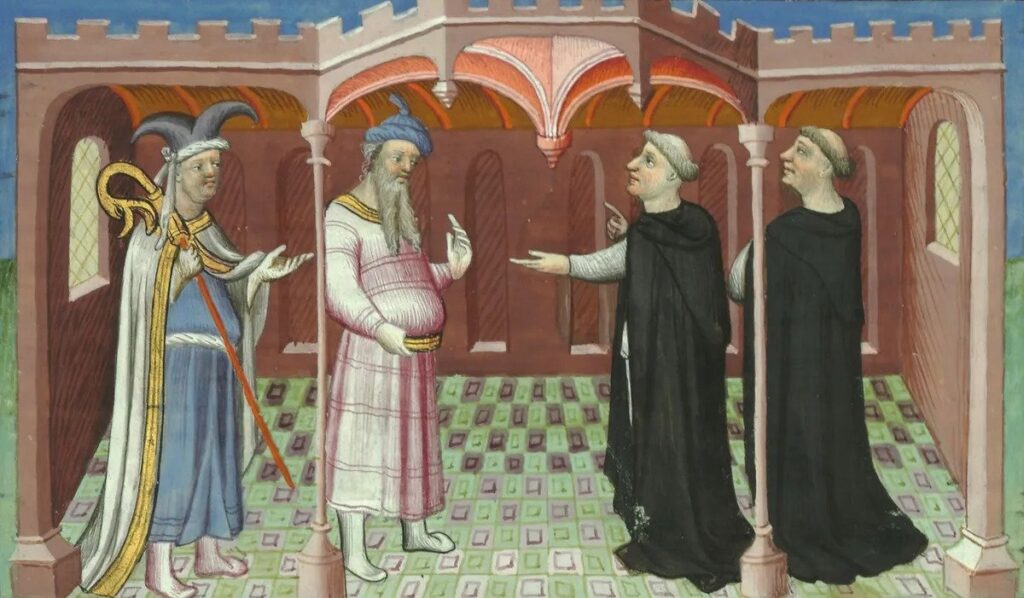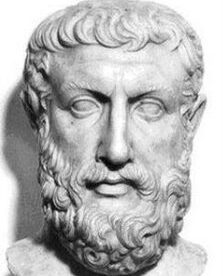
Available from Abebooks
Length of book: 106 pages
I was first made aware of this book via a video which covered Br. Riccoldo’s book The Travels, which recounts the whole of his mission throughout the East. The latter part of it, which covers his time in the city of Baghdad (then the center of the Islamic intellectual world) and his observations of Mohammendan society, as well as his refutation of their alleged holy book, the Koran. The quotes which the creator of that video lifted from this last section were so illuminating that I knew I had to acquire some physical copy of this work in order to learn more, and to better preserve and share this book. As it turns out, the latter part of The Travels has been separated into a smaller book called Refutation of the Koran, and so after some searching around, I was able to purchase a copy on Abebooks for around eight dollars (including the cost of shipping). This small price was absolutely worth it, for there is great wisdom contained within this little book.
It is truly a forgotten gem, as its learned author, in a mere hundred pages, delivers a series of arguments against Mohammendanism which are as devastating as they are concise. Throughout it he quotes the Koran itself, and illustrates the numerous errors, contradictions, and outright ridiculous fables contained therein.
Early into the book, Br. Riccoldo gives this very practical advice for those who find themselves in conversations with Mohammendans about our Faith, whether by chance or by our own initiation. This comes from his own experience, as he disputed with the Mohammedan intellectuals, something which he makes reference to whenever he discusses the “wise men” of Islam:1
So one should not put forward the holy beliefs to them right from the beginning, nor scatter pearls before the pigs, but at the beginning, one should show them the falsity of their law. For it is not right to sow virtues unless the diseases are first torn out by its roots.
(14)
One particularly striking part of this book is how Br. Riccoldo explains the Mohammedans’ argument for those who point out that there is an incongruity in the Koran, as according to the Old and New Testaments neither Christ nor the prophets spoke of their prophet. Their claim is that “the Jews corrupted the law of Moses and the prophets and the Christians corrupted the Gospel so that none of the truth remained in the law or the gospels apart from what is in the Koran” (19). Is this not an argument quite identical to that of the Protestants, who claim that the Holy Catholic Church corrupted the Scriptures, and that accursed Martin Luther therefore salvaged Holy Writ by removing seven books out of the Bible, along with modifying many verses that did not agree with his novel doctrines? Is this argument not similar to that of the sodomites and their supporters, who assert that the “original” Bible did not condemn sodomy, but that all the contents that reprove this sin which we find in the copies handed down to us where in fact the result of additions made by “bigoted” theologians? To all of these absurd claims, we ought to boldly respond, alongside Br. Riccoldo that “if they argue and want to say that the Gospel and Old Testament are completely corrupt, let them show the unchanged version of what has been changed and we will accept that” (23). See here the irony of this statement; we will have no need of accepting the “unchanged version”, because the witness of history evidently proves that no such thing exists!
Like with the Jews, the Mohammedan claim that the Church corrupted the Scriptures is truly a diabolical act of projection, as the present versions of their own Koran are substantially different from the original copies, as Br. Riccoldo illustrates:
Moreover, we find in their histories that the chapter of divorce used to exceed the chapter of the cow, which at first consisted of two hundred and thirty sentences, but now the whole [chapter] consists of twelve. However, others also say that the chapter of the cow once contained a thousand sentences, though today it contains eighty seven. They also refer to a powerful man called Elgas, who took eighty five sentences out of the Koran, and added the same number with different meanings. Therefore, how is it true what they say about the Koran, that God says, ‘We made a warning come down, and we shall preserve it’?
Some histories also narrate that Mohammed died of poison, and that the people did not have the Koran. However, when Abu Bakr accepted the position of leader, he ordered that everyone collect what he could, and composed this Koran that is in their hands, but he burned the rest.
(75-76)
It is noteworthy that it is said that Mohammed died of poison, for if this is true, then according to the words of Our Lord, we have yet another reason to scoff at the claim that this plunderer was a prophet. For concerning his followers, Our Lord said:
They shall take up serpents; and if they shall drink any deadly thing, it shall not hurt them: they shall lay their hands upon the sick, and they shall recover.
Mark 16:18
Therefore, if Mohammed was truly “the apostle of God”, as he blasphemously asserted, then why did God refuse to save him from being poisoned?
Here I shall briefly compile two more of my favorite excerpts, which I hope, dear reader, may help you to better understand the excellence of this Refutation:
…he [Mohammed] ordered it to be proclaimed that whoever says “There is no God but God”, he will enter Paradise, even if he is an adulterer or plunderer.
(37)
For when Zaid had divorced her, he said “Apostle of God, you should not take her as your wife.” And Mohammed replied, “Alas for you, God has given her to me.” After this, he gave this news about himself, saying that God has given her to the prophet. See how he concealed a lesser sin with a greater one. And indeed, Mohammed himself says, ‘There is no sin greater than to attach a lie to God.”
(41), with reference to K. 18.15
Evidently, from these two quotes alone, can one truly dispute that this man had more in common with Luther than with Christ?
I wish also to include this wonderful quote, which skillfully refutes the most common Mohammedan argument against the Blessed Trinity:
…Mohammed spoke the truth when he said that Jesus Christ the son of Mary is also the Word of God, but he did not understand it. For if he had understood it, he would have said, “Because he is the son of Mary, he is true man. Because he is the Word of God, he is true God.” For God is not mixed and imperfect like man. God’s Word, and understanding of the mind, and skill and doing are not man. But whatever is of God, is God. Whereby the Word of God is God, and the intellect of God is God, and the doing of God is God.
(88)
There are many other quotes I could list here and comment upon, but I think that I shall reserve all the other illuminating parts of this forgotten book for those who wish to seek it out for themselves.
As far as I am aware, this is the only translation of this work in English, which is surely a shame. The translator modestly admits that his translation “has not been carried out by any expert” and that anyone educated in Latin will “recognize this immediately” (v). As someone who has received some education in Latin, I certainly noticed that while the translation does come off as a little wonky at times, I did not experience much of an issue interpreting it. However, it is my hope that a faithful Catholic will one day produce a more accurate translation of this hard-hitting polemical work and will partner themselves with a trustworthy Catholic publisher, that it may be more easily known and circulated among the faithful. I would advise anyone who would take up this task to leave out the useless addition of Luther’s preface to his German translation of the Koran, included in this version by the translator.
I close out this review with this prayer for the conversion of the Mohammendans. I pray that through the study of this little book, more Catholics may work and pray for the salvation of these poor souls:
O Jesus, true God and true man, Redeemer of the whole world, we humbly beseech thee through the Immaculate Heart of Mary to turn thine eyes of mercy upon those peoples who have lived for so many centuries under the yoke of Islam. Oh, forgive them whatever they have committed against thy chosen people to the dishonour of thy Most Holy Name and of the Christian name. Dispel the darkness in which they are enveloped by the rays of thy light, and through the laver of regeneration open to them the treasures of thy Heart, that in confession of the true faith they may worship and glorify thee, the eternal Word made flesh for our salvation, together with the Father and the Holy Ghost. Amen.
Acta Romana Societatis Iesu Anno 1924, pp. 556–7
P.S.
This is the video I referenced at the beginning of this review. Skip ahead to 1:02:00 for the section which corresponds with the Refutation.
